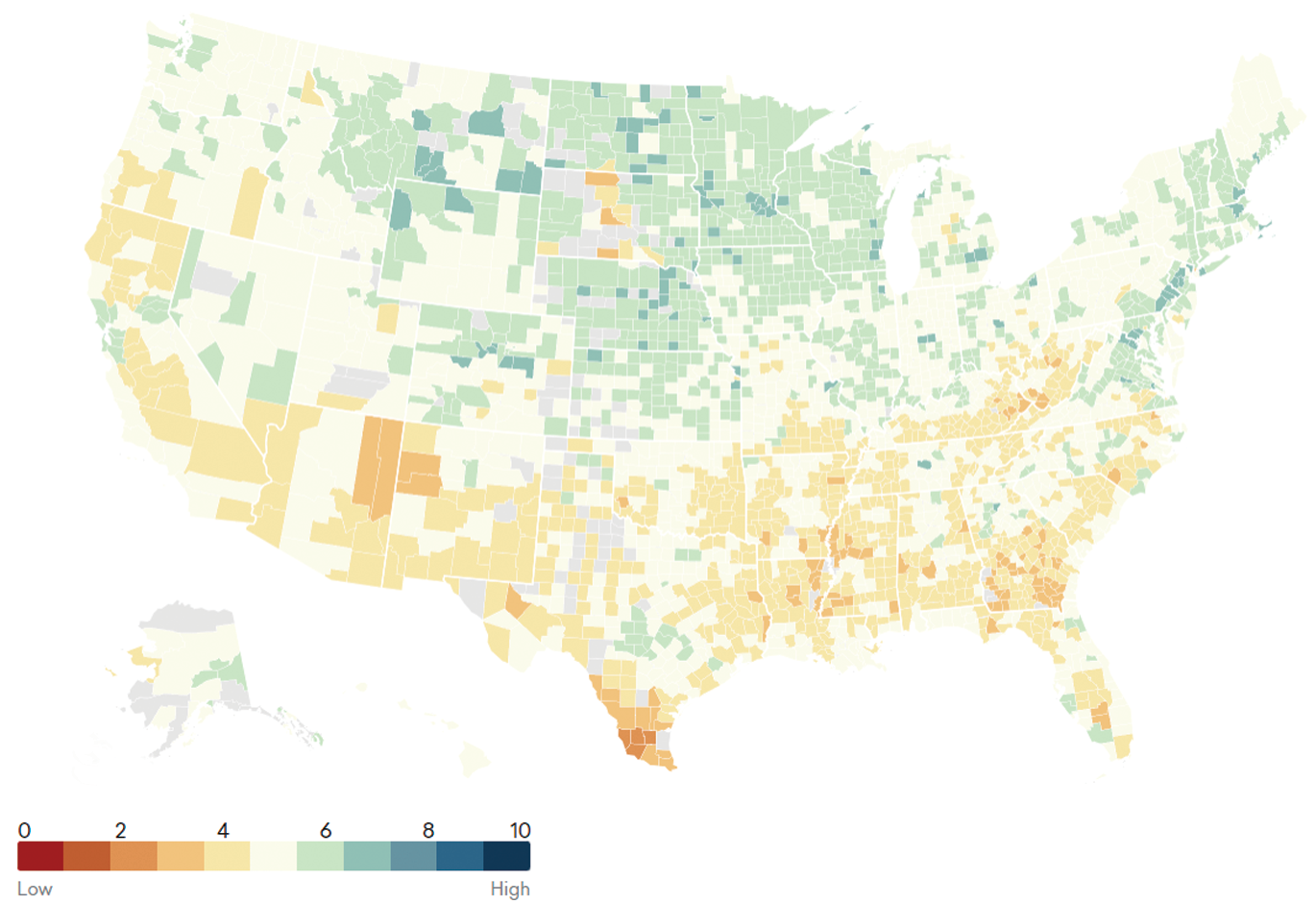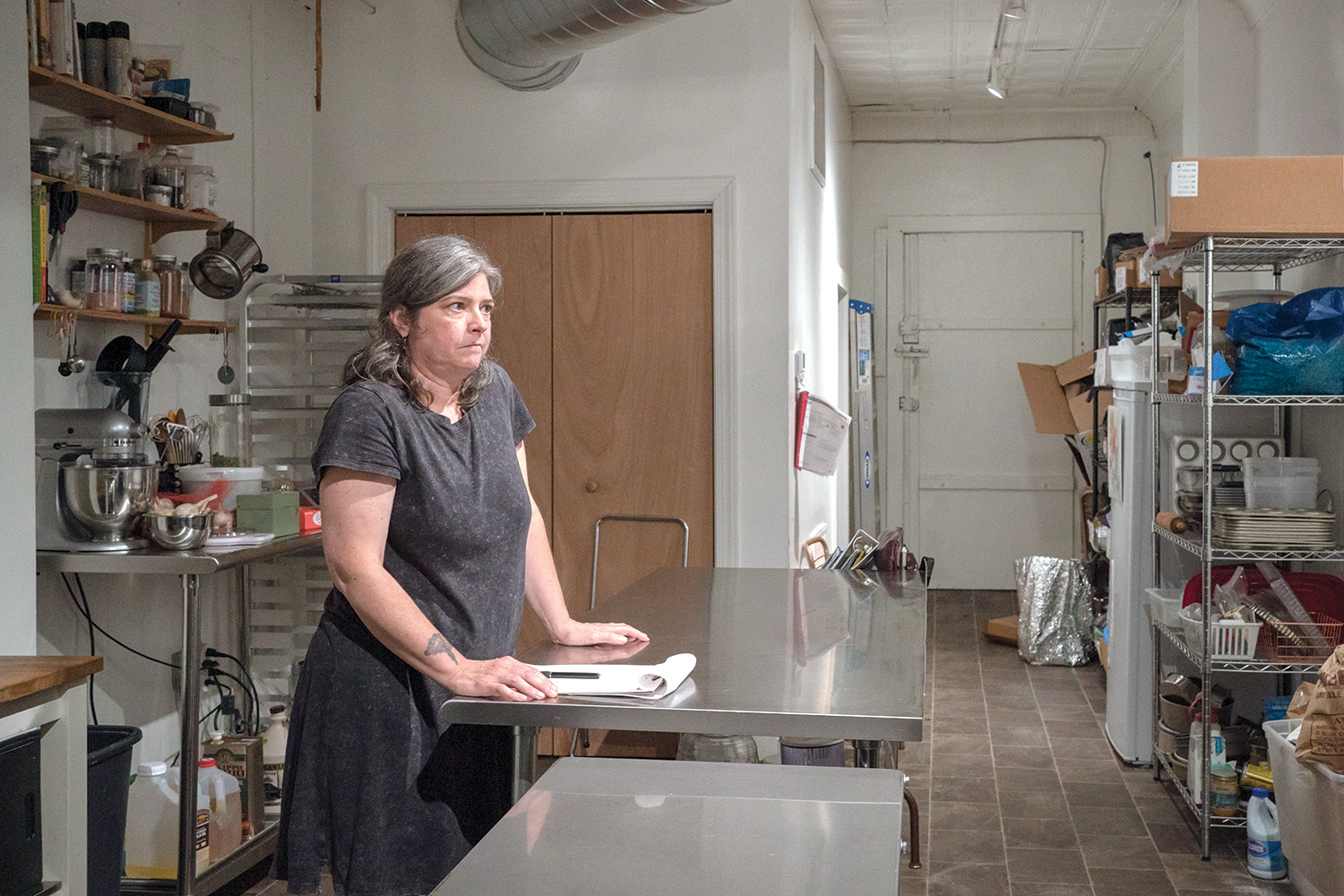By Kelsey Ensign, Louis W. Cabot Humanities Policy Fellow, and Victor Lopez, Program Associate for American Institutions, Society, and the Public Good
As the United States approaches the 2024 presidential election, several journalists and commentators have been puzzled by one question: “Why do Americans seem so unhappy with an economy that appears to be doing so well?” Polls are influenced by many factors, but recent results show how pessimistic many Americans feel about the economy. And yet, judged by traditional economic metrics like the GDP or the Dow Jones, the economy is doing well. How do we explain this paradox?
A new Academy report, Advancing a People-First Economy, helps resolve this tension at the center of the nation’s political conversation. The report focuses on how we might imagine and prioritize a people-centered economy through a new measurement tool, a photojournalism project, and policy recommendations.
The report is the culmination of more than two years of deliberation by the Academy’s Commission on Reimagining Our Economy. The crosspartisan and interdisciplinary Commission was formed to rethink the metrics, narratives, and values that shape the American political economy and is led by Katherine J. Cramer (University of Wisconsin–Madison), Ann Fudge (formerly Young & Rubicam), and Nicholas Lemann (Columbia Journalism School). Most groups studying the economy include primarily economists and business leaders. Multidisciplinary work is a hallmark of Academy projects, and the Commission comprises scholars, artists, journalists, and leaders from the faith, labor, business, nonprofit, and philanthropic communities.
This diverse makeup helped shape the ideas and recommendations in the Commission’s final report. In Advancing a People-First Economy, the Commission argues that too much attention is focused on how the economy is doing and not enough is focused on how Americans are doing. The economy should be evaluated not just on its productivity and growth, but also on its ability to improve people’s well-being.
To inform its deliberations, the Commission heard directly from Americans about their economic experiences. In over thirty listening sessions held across the country, members of the Commission met with people from all walks of life. People on all sides of the political spectrum shared remarkably similar insights: how hard it is to stay ahead in the current economic system, how greed seems to be the main value that shapes the economy, how people want a fair chance to improve their lives. The listening session recordings are being archived at the Library of Congress.
These conversations helped to shape the Commission’s work, especially its final report. Advancing a People-First Economy offers fifteen recommendations that, together, provide a path toward an economy that prioritizes Americans’ well-being. The report is organized around three values that are central to the Commission’s work:
- Security
- Opportunity and Mobility
- Democracy
Across these three categories, the fifteen recommendations cover topics that are often not considered together, such as zoning reform, rural broadband, and antitrust. The diversity of recommendations reflects what the Commission heard in its listening sessions. Americans face a wide range of challenges, which require an equally wide range of solutions.
Overview of Recommendations
Security
- Redesign safety nets to ensure stability
- Adopt inclusionary zoning policies to increase the housing supply
- Reform childcare and health care to lower costs and facilitate benefit portability
- Expand access to low-cost banking for low-income earners
Opportunity and Mobility
- Remove regulations preventing people from participating in the labor market
- Bolster worker training and education pathways through private-sector upskilling and a strengthened community college system
- Extend to Black World War II veterans and their descendants the housing and education benefits they were denied under the 1944 GI Bill
- Expand broadband connectivity for rural, tribal, and underserved urban areas
- Allow states or municipalities to sponsor immigrants to boost their economies
Democracy
- Create a training and financing program to help working-class Americans run for political office
- Deconcentrate economic power
- Revise the tax code to incentivize work and end tax policies that benefit the wealthy
- Support tribal governmental infrastructure to facilitate Native American self-determination
- Facilitate the creation of robust local and community media
- Promote economic connectedness
In addition to the final report, the Commission released two other products that place people at the center of economic analysis. One is the CORE Score, a county-level data dashboard to measure well-being. The other is a photojournalism book, Faces of America: Getting By in Our Economy, released in September 2023. The photojournal features images of Americans from four median-income communities: Tulare County, California; Dearborn, Michigan; the Third Ward in Houston, Texas; and Williamsport, Pennsylvania. Economic photojournalism often features people from either the highest or lowest extremes of the economic spectrum. The Commission’s photojournal highlights middle-income individuals and families at home, at work, and serving their community. Paired with quotes from the listening sessions, Faces of America highlights Americans’ struggles, their aspirations, and their resiliency.
The CORE Score

Typical economic metrics focus solely on growth. In its deliberations, the Commission identified a need for better ways to measure Americans’ well-being and their relationships to the institutions that structure their lives. As part of its effort to build a people-first economy, the Commission released a new index of American well-being, named the CORE Score. Rooted in eleven county-level measures, the Score provides a window into geographic disparities as well as differences along lines of race/ethnicity, age, income, education, and sex. The measurements are divided across four categories:
- Economic Security
- Economic Opportunity
- Health
- Political Voice
Visit www.corescore.us to review the Score for your community.
The Commission’s three products seek to develop a new set of priorities for the economy: an economy that is working well should work for the people who make it work. The Academy is dedicated to advancing the Commission’s ideas by disseminating these products widely, both among its members and the general public. This work began in October 2023 with a Stated Meeting for Academy members in New York City, followed by a virtual launch event in November 2023 to mark the release of the final report and the CORE Score.
New York City Stated Meeting — Americans and Our Economy: A Conversation about the Human Stakes
On October 18, 2023, the Commission shared its recommendations with Academy members at a Stated Meeting convened by the New York Program Committee. The Commission’s cochairs and Academy President David Oxtoby discussed the Commission’s process for selecting the recommendations. Serene Jones, president of Union Theological Seminary and a Commission member, offered closing remarks about the Commission’s values.
The cochairs spoke about the Commission’s commitment to prioritizing people. While some recommendations are aimed at helping lower-income earners, the cochairs noted that the report as a whole is particularly focused on helping median-income Americans. Though some recommendations may seem ambitious, the cochairs pointed to the current political landscape, in which both political parties are vying to serve as the champion of the working class. In this environment, the cochairs hope that the Commission’s bold agenda can resonate across partisan lines and offer a blueprint for a set of policies that would benefit American workers.
While the Commission achieved consensus on these recommendations, doing so was not always easy. Commission members did not always agree: from the details of individual recommendations to the diagnosis of the problems facing the economy that need to be solved. Economic inequality offers an important example. On one hand, some Commission members perceived inequality as a systemic problem responsible for many of the challenges facing the economy. Other Commission members, however, believed that addressing inequality was not as important as ensuring sufficiency and opportunity for those at lower income levels.
In a time of polarized politics, the Commission hopes to serve as a model for the importance of dialogue and consensus. At the New York meeting, the cochairs highlighted open and frequent communication as a path forward. Frequent deliberation and extended discussion of specific issues allowed the views of each member to be reflected. The Commission offers evidence that Americans from across the ideological spectrum can in good faith get together and identify solutions to the nation’s biggest problems.
The cochairs pointed to the Commission’s central values: Security, Opportunity and Mobility, and Democracy. Serene Jones’s closing remarks focused on these values, and specifically on the necessity of embedding moral values into the fabric of economic policy. Referencing the philosophical insights of Adam Smith, Jones stressed the historical importance of aligning economic endeavors with the greater good. She lauded the Commission’s approach for its ethical grounding and noted that the fifteen value-driven recommendations would help deliver the nation closer to an economy that supports flourishing and prosperity for all.
Launch Event
On November 9, 2023, the Commission marked the release of Advancing a People First-Economy and the CORE Score with a virtual event. Commission member Anna Deavere Smith (writer and actress) delivered opening remarks, in which she emphasized the Commission’s shift from traditional economic policies to a human-centric approach. Following her comments, New York Times senior writer David Leonhardt moderated a panel discussion with the cochairs. And before the question-and-answer period, Commission member Jacob Hacker (Yale University) provided an overview of the CORE Score.
During the panel discussion, the cochairs spoke about the conditions that make the Commission’s work particularly timely, such as a rise in food insecurity; health disparities across lines of race/ethnicity, education, and income; and the decline in American life expectancy. They highlighted the effects of concentrated economic power, particularly in rural and lower-income areas. The cochairs also discussed a recurring theme from the listening sessions: that Americans’ financial insecurity leads to a sense of powerlessness and frustration with government institutions. The discussion underscored the interconnectedness of economic well-being, democratic health, and national mood. To emphasize these connections, Katherine Cramer played selections from the listening sessions.
In introducing the CORE Score, Jacob Hacker explained why the nation needs such metrics and why its four categories offer a better encapsulation of well-being than traditional systems of measurement. He emphasized the CORE Score’s capacity for comparing counties to one another and to viewing demographic disparities within counties, states, and the nation.
The event marked the beginning of the final phase of the Commission’s work, which will focus on outreach and implementation. The Academy will work to advance the fifteen recommendations and to disseminate the Score and the photojournal among policymakers, journalists, and the general public. These efforts have already yielded success with early coverage of the Commission’s work in Bloomberg, Reuters, and The New Republic.
Over the course of the coming year, the Academy will continue the vital effort of working toward building an economy that better serves the American people.
The Academy would like to thank the individuals and organizations that have supported the Commission on Reimagining Our Economy: The William and Flora Hewlett Foundation, The C&P Buttenwieser Foundation, The James Irvine Foundation, Omidyar Network, David M. Rubenstein, and Patti Saris.
To learn more about the Commission on Reimagining Our Economy, please visit the Academy’s website.
